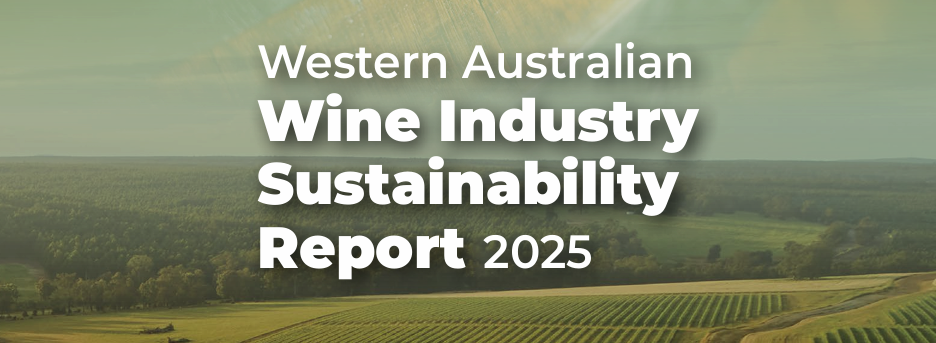A message from Wines of WA Sustainability Program Manager Eloise Jarvis
“I am proud to present to you Wines of Western Australia’s inaugural Western Australian Wine Industry Sustainability Report 225, which does three critical things: establishes our 2021 carbon baseline, showcases what’s already working, and charts the strategic pathway to make WA a recognised leader in sustainable wine production by 2029.
This significant milestone has been made possible through the generous funding support from Wine Australia and the collaborative partnerships established with the Department of Primary Industries and Regional Development and our WA Regional Wine Associations throughout 2024-2025. The development of our strategic plan has been expertly guided by our Industry Reference Group, comprising 14 members representing all regional associations, production scales, viticulture, and industry expertise. Their dedicated guidance over nine months has been instrumental in creating a truly representative vision for our industry’s sustainability future.
The 2021 baseline reveals 160,736 tonnes CO₂e across our industry, with packaging accounting for 41% of total emissions – our clearest target for impact. The Sustainability in Practice profiles demonstrate practical outcomes: Aylesbury Estate’s $15,000 irrigation upgrade achieving 30-40% water savings, Beulah Wines restoring creek lines for $2,000 per hectare, and Cherubino Wines reaching carbon negative status through soil management.
Our 2025-2029 Strategic Plan targets 42% emissions reduction, 75% certified producers, and 30% water savings by 2030. With 75% of our 146 Sustainable Winegrowing Australia members already certified (above the 55% national average), we’re building from strength. Regional innovations like Margaret River’s lightweight glass initiative show how good ideas scale statewide through collaborative partnerships.
While challenges are real – winter rainfall declining 10-20% since the 1970s and increasing market demands for sustainability credentials – producers acting now will gain competitive advantages. Whether you’re measuring your carbon footprint for the first time, exploring certification options, or scaling existing sustainable practices, the report provides frameworks, case studies, and contact points to move forward.
This is our roadmap, not our destination. The baseline data gives us credibility, the case studies provide proof of concept, and the 2025-2029 Strategic Plan offers clear direction. Through the Wine Industry Partnership with DPIRD, our industry now has the collaborative framework and strategic support necessary to implement these initiatives effectively and deliver measurable outcomes. We look forward to continuing our collective efforts to position Western Australia as a global leader in sustainable wine production.”
Best regards
Eloise Jarvis
WoWA Sustainability Program Manager
Find Sustainability Report here


Recent Comments